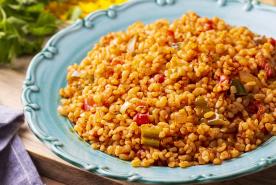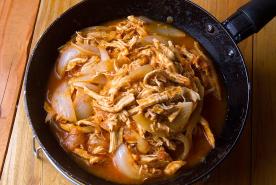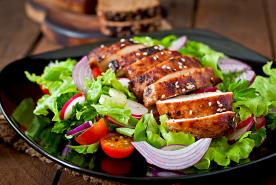November 03, 2022
Your diet plays a big role after a kidney transplant. Do you know which foods to avoid or how your transplant medications affect what you can eat? Kidney transplant dietitian, Karen Greathouse, is here to break it down.
Will my diet change after a kidney transplant?
Your diet expands significantly after a kidney transplant–especially if you've been following a restrictive diet for end-stage kidney disease. However, what you should and shouldn't eat will depend on your other health conditions and reactions to the transplant drugs you take to maintain your new kidney.
"Diets, medications, and other health conditions (like diabetes or high blood pressure) are all factors in a diet," said Greathouse. "A lot will be individualized based on your lab values and healthcare needs."
Everyone is different, so always speak with a kidney dietitian or your healthcare provider before making any changes to your diet. Find a kidney dietitian near you.
Transplant medication side effects
Transplant medications are critical to maintaining your new kidney; however, they may also come with side effects like lowering magnesium, calcium, and phosphorus levels.
Transplant medications can also increase:
- Appetite
- Blood fats like cholesterol and triglycerides
- Blood sugar levels
- Potassium
- Blood pressure
We recommend working with your transplant team to create a diet that considers these effects.
You may need to:
- Eat more fruits, vegetables, and whole grains
- Choose reduced-fat dairy products and lean meats
- Reduce how much sodium (salt) you consume
- Count carbohydrates or sugar intake
- Follow a heart-healthy diet low in trans and saturated fats
Learn more about nutrition and kidney transplant.
Weight gain after kidney transplant
If you gain weight after the transplant, don't panic. It's not uncommon to put on some pounds, but it is important to get to a healthy weight and stay there. Obesity can increase the risk of developing new-onset diabetes, high blood pressure, or heart disease. Ask your healthcare team how to reach your goal weight safely
"A lot of people gain weight after the transplant because they feel better and have an increased appetite or have side effects from transplant drugs," said Greathouse. "Sometimes we get carried away drinking a lot of juice and eating sugary or salty foods that we've been restricting."
Here are three ways to stay at a healthy weight:
- Exercise: Start with mild activities like walking or jogging for 10 to 15 minutes a day, working up to 30 or 60 minutes most days of the week. Don't start or change your workout plan before speaking with a healthcare professional first.
- Portion control: Greathouse recommends following the USDA's MyPlate guidelines where half your plate is veggies and fruit, a quarter is protein, and a quarter is carbohydrates.
- Don't cut out "unhealthy" foods: Cutting out foods you love may lead to a vicious cycle of restricting and binging. Instead, incorporate your favorite "unhealthy" foods in moderation.
"A healthy weight can look different for different people. You can be a little heavier and be healthy because you're eating a well-balanced diet and exercising," Greathouse said. "At the same time, being thin doesn't necessarily mean that you're healthy, either."
Join After Transplant, our self-paced program for new kidney transplant recipients, for more health tips and tricks.
What foods to avoid
After a transplant, there may be foods you can't eat because they can interfere with the immunosuppressant drugs.
"What you can't eat depends on what medications you're on. You should get a list of what to avoid," said Greathouse. "Timing of the medication is also important because some immunosuppressive drugs can interfere with the absorption of nutrients."
Some common foods that interact with immunosuppressants include:
- Grapefruit or grapefruit juice
- Pomegranate or pomegranate juice
- Some herbal teas
You'll also need to avoid foods that could make you sick due to your weakened immune system.
"Food safety is a huge concern because a foodborne illness could land a transplant recipient in the hospital," Greathouse said. "When microwaving food, make sure it reaches 160 degrees to kill any bacteria. Try to eat leftovers within two or three days and I also really discourage people from eating at buffets."
Foods to avoid include:
- Moldy, spoiled, or food past their "use by" date
- Raw or undercooked meat, fish, and poultry
- Unpasteurized milk, cheese, or yogurt
- Uncooked or undercooked eggs and any products containing them
- Unwashed or damaged fruits and vegetables
Learn more about foods to avoid after transplantation.
Get the latest in kidney research and treatment
Join us as we highlight the latest in kidney research, bring you up-to-date on kidney care, and answer questions from patients to help them live well with kidney disease or a transplant. Subscribe to Hot Topics in Kidney Health.


















